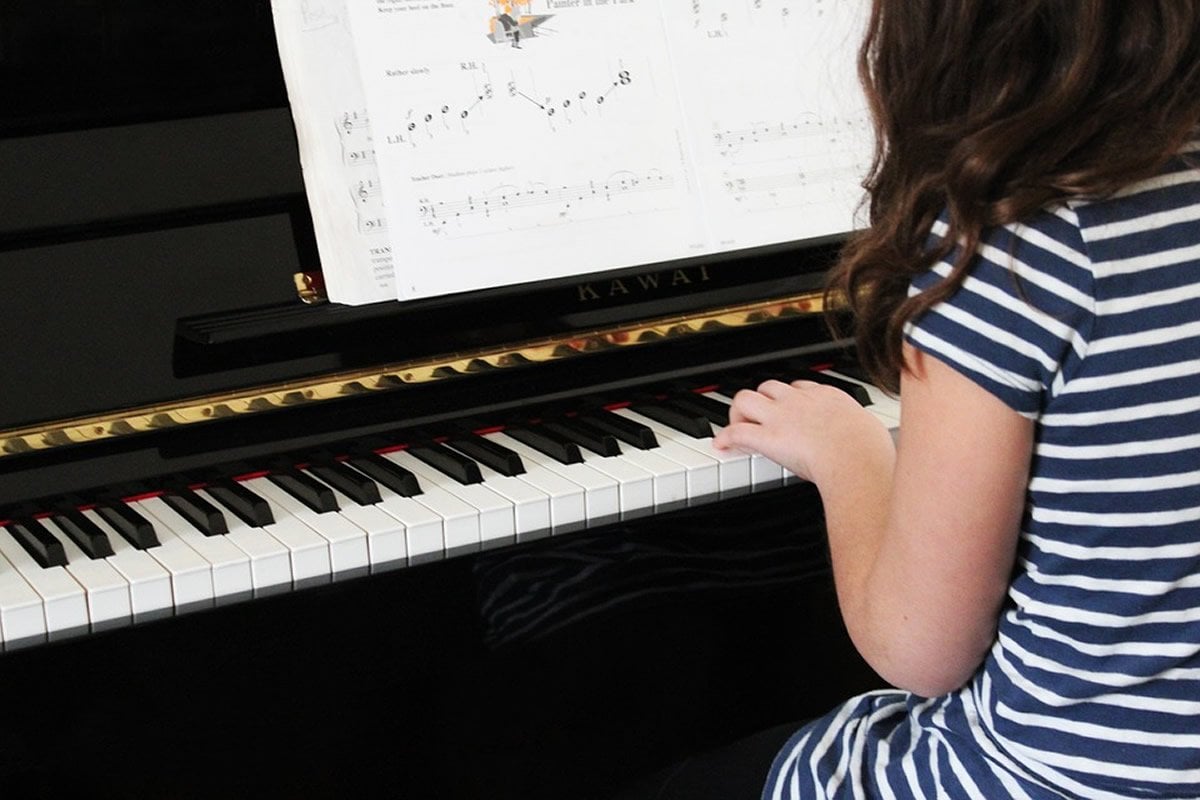Summary: Highly engaged instrumental music students were, on average, academically over a year ahead of their non-musical peers.
Source: University of British Columbia
High school students who take music courses score significantly better on math, science and English exams than their non-musical peers, according to a new study published in the Journal of Educational Psychology.
School administrators needing to trim budgets often look first to music courses, because the general belief is that students who devote time to music rather than math, science and English, will underperform in those disciplines.
“Our research proved this belief wrong and found the more the students engage with music, the better they do in those subjects,” said UBC education professor and the study’s principal investigator, Peter Gouzouasis. “The students who learned to play a musical instrument in elementary and continued playing in high school not only score significantly higher, but were about one academic year ahead of their non-music peers with regard to their English, mathematics and science skills, as measured by their exam grades, regardless of their socioeconomic background, ethnicity, prior learning in mathematics and English, and gender.”
Gouzouasis and his team examined data from all students in public schools in British Columbia who finished Grade 12 between 2012¬ and 2015. The data sample, made up of more than 112,000 students, included those who completed at least one standardized exam for math, science and English, and for whom the researchers had appropriate demographic information–including gender, ethnicity, neighbourhood socioeconomic status, and prior learning in numeracy and literacy skills. Students who studied at least one instrumental music course in the regular curriculum counted as students taking music. Qualifying music courses are courses that require previous instrumental music experience and include concert band, conservatory piano, orchestra, jazz band, concert choir and vocal jazz.
The researchers found the predictive relationships between music education and academic achievement were more pronounced for those who took instrumental music rather than vocal music. The findings suggest skills learned in instrumental music transfer vary broadly to the students’ learning in school.
“Learning to play a musical instrument and playing in an ensemble is very demanding,” said the study’s co-investigator Martin Guhn, an assistant professor in UBC’s school of population and public health. “A student has to learn to read music notation, develop eye-hand-mind coordination, develop keen listening skills, develop team skills for playing in an ensemble and develop discipline to practice. All those learning experiences, and more play a role in enhancing the learner’s cognitive capacities, executive functions, motivation to learn in school, and self-efficacy.”

The researchers hope that their findings are brought to the attention of students, parents, teachers and administrative decision-makers in education, as many school districts over the years have emphasized numeracy and literacy at the cost of other areas of learning, particularly music.
“Often, resources for music education–including the hiring of trained, specialized music educators, and band and stringed instruments–are cut or not available in elementary and secondary schools so that they could focus on math, science and English,” said Gouzouasis. “The irony is that music education–multiple years of high-quality instrumental learning and playing in a band or orchestra or singing in a choir at an advanced level–can be the very thing that improves all-around academic achievement and an ideal way to have students learn more holistically in schools.”
Source:
University of British Columbia
Media Contacts:
Wan Yee Lok – University of British Columbia
Image Source:
The image is in the public domain.
Original Research: Closed access
“A population-level analysis of associations between school music participation and academic achievement”. Guhn, Martin; Emerson, Scott D.; Gouzouasis, Peter.
Journal of Educational Psychology. doi:10.1037/edu0000376
Abstract
A population-level analysis of associations between school music participation and academic achievement
The present study employed population-level educational records from 4 public school student cohorts (n = 112,916; Grades 7–12) in British Columbia (Canada) to examine relationships between music education (any participation, type of participation, music achievement, and engagement level) and mathematics and science achievement in Grade 10 as well as English achievement in Grades 10 and 12, while controlling for language/cultural background, Grade 7 academic achievement, and neighborhood socioeconomic status. Music participation was related to higher scores on all 4 subjects and these relationships were stronger for instrumental music than vocal music (Cohen’s d range: .28 to .44 [small-medium effect sizes] and .05 to .13 [null-small effect sizes]). School music achievement positively related to scores on all subjects; such relationships were stronger for achievement in instrumental music compared with vocal music. Higher levels of music engagement (number of courses) was related to higher exam scores on all subjects; this pattern was more pronounced for very high engagement in instrumental music (d range: .37 to .55; medium effect sizes) compared with vocal music (d range: .11 to .26; small effect sizes). The effect sizes of these group differences are greater than the effect sizes corresponding to average annual gains of students’ academic achievement during high school—in other words, highly engaged instrumental music students were, on average, academically over 1 year ahead of their peers. The findings suggest that multiyear engagement in music, especially instrumental music, may benefit high school academic achievement. Findings and implications are discussed within the broader interdisciplinary literature on music learning.
Educational Impact and Implications Statement
This large-scale study identified evidence of positive relationships between school music participation and high school exam scores in English, mathematics, and science using population-level educational records for over 110,000 students in British Columbia, Canada. Participation in school music (especially instrumental music) was related to higher exam scores, and students with higher levels of school music engagement had higher exam scores. The positive relationships between music engagement and academic achievement were independent of students’ previous (Grade 7) achievement, sex, cultural background, and neighborhood socioeconomic status, and were of considerable magnitude: The group differences observed in our study were greater than average annual gains in academic achievement during high school. In other words, students highly engaged in music were, on average, academically over 1 year ahead of the peers not engaged in school music. In light of this study (the largest of its kind to date), as well as supporting evidence suggesting music learning in childhood may foster competencies (e.g., executive functioning) that support academic achievement, educators may consider the potential positive influence of school music on students’ high school achievement.






